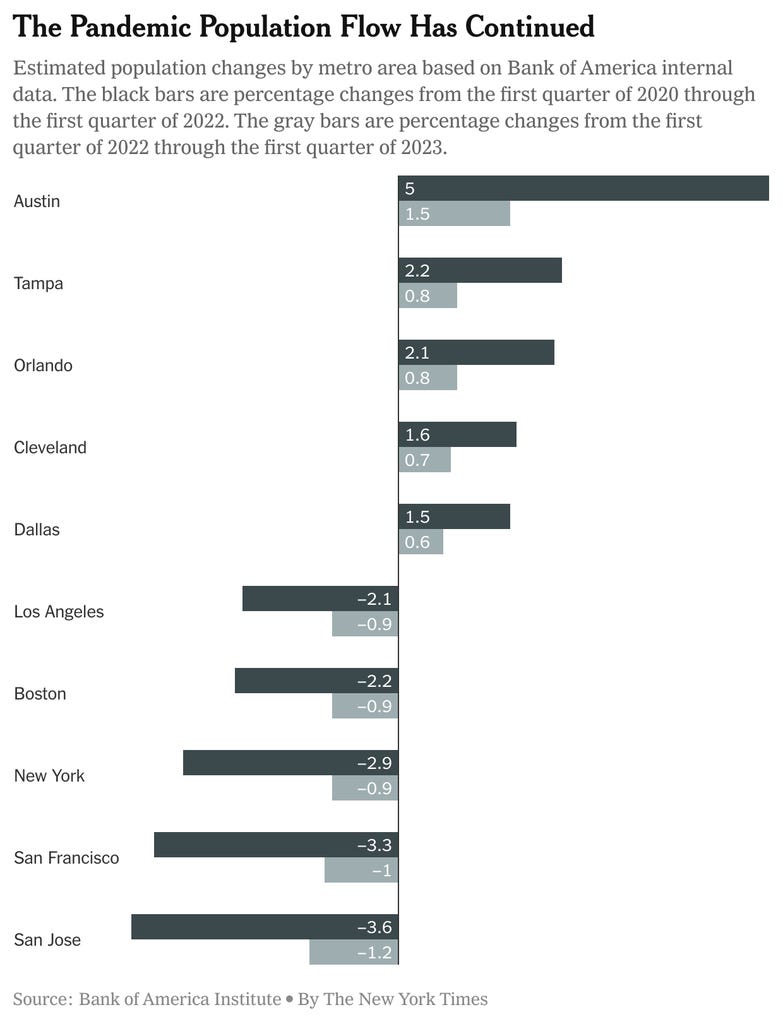
Quote of the Moment
The process you use to get to the future is the future you get.
| Myron Rogers
Elsewhere
Supervisors Driven By Bottom Line Fail To Get Top Performance From Employees, Baylor Study Says | A 2019 study by Matthew Quade, Benjamin McLarty, and Julena Bonner, found bottom-line management is a bad idea. (I wrote about this in 2019, in No Mistakes, No Poetry.)
…
Dror Poleg writes a jeremiad against back-to-the-office and productivity-based management:
It's not an office crisis. It's a crisis of work itself. Too many people, including senior executives, have no idea what they're doing and for what purpose. Covid forced us to answer a few simple questions, and we've been scrambling for answers ever since.
He goes on to dissect a leaked excerpt of an all-hands meeting announcing a back-to-the-office announcement by the CEO of Clearlink, James Clarke (covered by other news outlets). Clark jumps all over the place, seemingly changing his point of view, willy-nilly, about the sacrifices workers are making to return to the office but distancing himself from his decision to demand it. Poleg is baffled by this from Clark:
"I learned from one of our leaders that in the midst of hearing this message, he went out and sold his family dog...
[this] breaks my heart as someone who's been, you know, at the head of the humanization of pets movement in other businesses that we've built. But truly, those are the sacrifices that are being made, and I honor you for those sacrifices."
Then Poleg counters:
Indulge me for a moment, read that quote again, and pay attention to every word. This isn't English. It is a form of corporate poetry that must be dissected. Upon close reading, it conveys aggression and delusion and manipulation. And, perhaps most of all, it conveys confusion.
As Poleg points out, Clarke is the one requiring people to return to the office, he’s the one forcing them to make these sacrifices, but at the same time he’s ‘honoring them’ for it. And who is this ‘we’ he’s referring to in ‘the other companies we’ve built’? The royal we? Certainly not the ‘we’ that includes the people at the all-hands.
Poleg, again:
My 3.5-year-old daughter would have seen through this BS. No wonder people aren't engaged at work. What was this guy even talking about? What does he actually want?
My guess is he has no idea. That's what I thought when I heard that speech. And soon enough, more evidence emerged to corroborate that assumption.
Poleg proceeds to lampoon further material leaked, which leads to a wholesale fisking of the stream-of-consciousness blather that Clark produces, and then a deconstruction of the weak edifice of productivity-based management.
Go read the whole thing: Your Boss Has No Clue. It’s hilarious and snarky.
Factoids
“Pandemic migration trends are not reversing,” and Sun Belt cities are continuing to gain population at the expense of some of the nation’s biggest metro areas.
| Peter Coy writes about a report from the Bank of America Institute.
Cleveland is a non-sun-belt city that is one of the growth leaders in this migration, because of 'relatively affordable housing and a diversified economy: It has health care, finance, and manufacturing, all of which are doing well', and good word-of-mouth about 'cultural amenities'.
…
46 percent of knowledge workers currently work from home some of the time; 20 percent work from home all of the time. | WFH Research.
…
Traffic deaths had been declining until about a decade ago, when they began rising rapidly. The rise has been driven by a spike in pedestrian deaths. An estimated 3,500 pedestrians were killed in the first half of 2022, the most recent period for which data is available. That is the highest number in 40 years. The toll goes beyond fatalities. In 2019, the economic cost of auto crashes totaled $340 billion, according to the safety agency. In that year, 36,500 people died in auto accidents, 4.5 million were injured and 23 million vehicles were damaged. | Neal Boudette reports on the effects of Americans’ love for ever-larger trucks and SUVs.
…
Research from multiple Japanese railway operators that began installing blue lighting on platforms and at railway crossings more than a decade ago, [with] one study that showed an 84% decrease in the number of suicides over a 10-year period. | Jose Martinez on the magical impact of ‘airport blue’ lighting.
Is Passion a Ploy?
A new piece of research from Jon Jachimowicz and Hannah Weisman of Harvard Business School includes an analysis of 200m job postings in America. It finds that the number which explicitly mention “passion” rose over time, from 2% in 2007 to 16% in 2019. | Bartleby, The Economist
…
I wish that the researchers had extended their study into the pandemic and into the current day. I wonder what they would have found? I bet its luster has diminished in a time of quiet quitting and the great resignation.
Jachimowicz and Weisman approach the subject in a sufficiently neutral way, pointing out the promise — and pitfalls — of passion:
Keep reading with a 7-day free trial
Subscribe to Work Futures to keep reading this post and get 7 days of free access to the full post archives.



